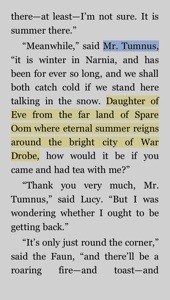I’m not sure where you all are in reading through The Lion, the Witch, and the Wardrobe (LWW) by CS Lewis*.
The scene where Lucy meets Mr. Tumnus is simply delightful. That he sees her as–in her essence–a human, a “Daughter of Eve” is so inspiring. And that he thinks “wardrobe” and “spare room” are geographical places is realistic, and funny.
*Reading Philippians a dozen times and LWW once are sorta the law of the Medes and Persians this summer.
Coming soon to CCC…
Journey to the Lamppost: A Narnia Adventure
[embedplusvideo height=”473″ width=”595″ standard=”http://www.youtube.com/v/PZsQ-_e8pkQ?fs=1″ vars=”ytid=PZsQ-_e8pkQ&width=595&height=473&start=&stop=&rs=w&hd=0&autoplay=0&react=1&chapters=¬es=” id=”ep7545″ /]
All children ages 3* to rising 5th graders are invited on our journey into Narnia! Join us as we play games, sing songs, create art, serve others and learn about Jesus and his amazing life.
*3 year olds require a parent or guardian to stay on property.
For more information or to register visit our VBS page on the church website.

As you begi your journey into Narnia through reading C.S. Lewis’s The Lion, the Witch, and the Wardrobe we will be providing complementary essays that will deepen your experience. Some of these readings will be helpful for adults, or books club discussions, while other readings will be more helpful for parents when answering questions children might ask.
Jerram Barrs wrote Echoes of Eden in C.S. Lewis’s The Lion, the Witch, and the Wardrobe.
Jerram Barrs:
In his Narnia books, Lewis very intentionally set out to tell the Christian story but not in such a way that those who were ignorant of or resistant to it would find it thrust in their faces. He wanted to capture the imaginations of children and touch their hearts just as he had been captured by the fantastic tales he had read when he was young. As an avid student of the Gospels, Lewis also knew that Jesus himself told wonderful stories which he used to communicate truth indirectly to people who, for all sorts of reasons, would no longer listen to straightforward presentations of it. Lewis wanted his stories, like the myths and fairy stories he loved, to reflect the underlying truths of reality but to do so even more deliberately. In fact, his goal was to ensure that his stories were full of “echoes of Eden.”
Continue reading Echoes of Eden at this link
The Opus Project’s Reading Group has embarked on a series with select works by C.S. Lewis and J.R.R. Tolkien that started in April and will go through August. In April we read Tolkien’s essay “On Fairy Stories”; next we turn to essays by Lewis in the collection The Weight of Glory, before joining in the church-wide “one read” of The Lion, the Witch, and the Wardrobe (to accentuate the summer Narnia-themed VBS program). Finally, we will discuss Lewis’ adult novel called Till We Have Faces.
Lewis is one of those names that anyone who gets anywhere near thoughtful streams of Christianity will hear quoted with much frequency. And yet, I would be willing to wager that most of us rarely read Lewis beyond his most famous works (Mere Christianity, The Lion, the Witch, and the Wardrobe, Screwtape Letters). For some he can be seen as overplayed and outdated. But we suspect there’s much more to Lewis than we’re accustomed to hearing.
I hope you will consider joining us as we look deeper into Lewis as a resource for recovering the Christian imagination . We will meet on Sunday, June 2 at 9am during the education hour to discuss The Weight of Glory (get your copy now). We will primarily discuss the title essay “The Weight of Glory”, though we hope to get to others as well.
While you are at it, why don’t you bundle together an order for our next couple of months? We will discuss in various forums The Lion, the Witch, and the Wardrobe on June 30. Then for July 28 and August 25, we’ll read Till We Have Faces.
Hope you’ll plan on joining in on the conversation.
He began the good work that is our salvation. (Cf Phil 1:6)
“The Prodigal Son at least walked home on his own feet. But who can duly adore that Love which will open the high gates to a prodigal who is brought in kicking, struggling, resentful, and darting his eyes in every direction for a chance of escape?
Loading…
The words compelle intrare, compel them to come in, have been so abused by wicked men that we shudder at them;
but, properly understood,
they plumb the depth of the Divine mercy.
The hardness of God is kinder than the softness of men, and His compulsion is our liberation.” –Lewis
About This Blog
This blog is one of the primary ways that Christ Community's staff can connect and share information. Look for important updates on our community life here each week.
Visit the CCC Website.
View our Church Calendar.
Reminders & Reflections
Blog Archive
- June 2015
- May 2015
- April 2015
- March 2015
- February 2015
- January 2015
- December 2014
- November 2014
- October 2014
- September 2014
- August 2014
- July 2014
- June 2014
- May 2014
- April 2014
- March 2014
- February 2014
- January 2014
- December 2013
- November 2013
- October 2013
- September 2013
- August 2013
- July 2013
- June 2013
- May 2013
- April 2013
- March 2013
- February 2013
- January 2013
- December 2012
- November 2012
- October 2012
- September 2012
- August 2012
- July 2012
- June 2012
- May 2012
- April 2012
- March 2012
- February 2012
- January 2012
- December 2011
- November 2011
- October 2011
- September 2011
- August 2011
- July 2011
- June 2011
- May 2011

